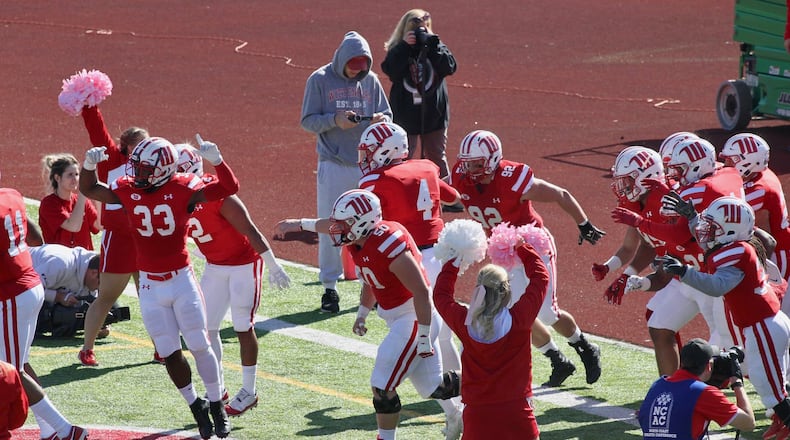“Granted it’s hard for me to talk about the positives when places like New York and New Jersey and Detroit and Louisiana have just been devastated,” Fincham said Tuesday.
» RELATED: Former Tiger now a baker in London
The scale of the COVID-19 crisis also puts his football program’s problems in perspective. The loss of the entire spring practice season, for example, isn’t a big deal in the grand scheme of things. The loss of an entire football season, which is on the minds of many people these days, is another matter.
While Fincham said his players haven’t asked him directly about the potential of the season being postponed or cancelled, he gets the question often when he’s out for a walk or a jog in Springfield and runs into friends and neighbors.
“I’m not out much, but I get text messages from people,” Fincham said. “Everybody wants your opinion, and my opinion is this: being a Division III coach, I’m along for the ride, and to a degree, even (Ohio State coach) Ryan Day is along for the ride. But I’m optimistic. I know that’s probably a word not a lot of people associate with me, but it’s the truth. I think there are a lot of smart people in the world who are capable of figuring this thing out.”
Assuming there is football in the fall, it will be Fincham’s 25th as Wittenberg’s head coach. He’s 217-48. The Tigers finished 7-3 last season and certainly would have benefited from spring practices.
“There’s two ways of looking at just about everything,” Fincham said. “For us individually, we’ll be a young team in some areas, and when you’re young, spring practice is pretty important. It’s always good to have that time to get your guys a good level of conditioning before they go home for the summer. If you’ve got a veteran football team, there’s a lot more bad that can happen to you than good in the spring in terms of somebody getting hurt or whatever it may be.”
» WHERE ARE THEY NOW: Witt alum gets coaching job at Denison
Spring practice has evolved at the Division III level. Fincham didn’t spend much time with his players at all in the spring early in his Wittenberg career. Nowadays the team gets 16 practices. Last year, it wrapped up on April 28. This year, it never got started.
“Does it set us back? Sure,” Fincham said. “But we’re all playing with the same deck of cards right now.”
Wittenberg was on spring break in March when sports events across the country started getting cancelled and universities moved to online classes. Fincham was on vacation in Florida with his family. Upon returning, he first checked with all his coaches and players to make sure they were doing OK, especially on the academic front.
The Wittenberg coaches then sent strength and conditioning plans to all the players, knowing it would be a challenge for them to keep up with no gyms open.
“Some kids have weight sets in their basements,” Fincham said, “and some kids are filling up milk jugs full of water to use. That’s been really hectic. As coaches, I don’t look at it as a control thing. I look at it as wanting to see your guys and provide assistance in places they may need it.”
Fincham recognizes the difficulties for the players, who have seen their daily routines blown apart. The coaches talk to their different position groups on Facetime or Zoom once every seven to 10 days, and Fincham has had a number of one-on-one conversations with his players.
“You don’t have an 8 o’clock class,” Fincham said. “You’re getting your homework online and doing it as you see fit. I see it in my own house. We go from rolling everybody out of bed at 6:30 and you’re rocking and rolling to there’s been some days around here where I haven’t seen kids until late morning at best. Those are the things that have been really challenging: trying to keep everybody together and keeping them focused and keeping them on a routine.”
About the Author

